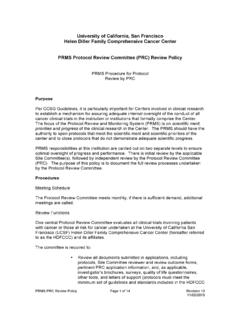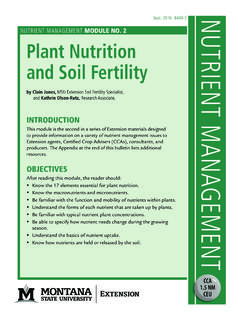Transcription of Womens Health Matters - UCSF Helen Diller Family ...
1 women 's Health Matters nutrition & Breast Cancer Natalie Ledesma, MS, RD, CSO. Ida & Joseph Friend Cancer Resource Center UCSF Helen Diller Family Comprehensive Cancer Center University of California, San Francisco Good nutrition may reduce the incidence of breast cancer and the risk of breast cancer progression or recurrence. There are many studies in progress to help further understand how diet and cancer are related. We do know, however, that improved nutrition reduces risk of chronic diseases, such as diabetes, obesity, hypertension and heart disease, and also enhances overall quality of life.
2 It is estimated that one third of cancer deaths in the can be attributed to diet in adulthood [1]. Guidelines for a Healthy Diet Plant-based diet o Plenty of fruits and vegetables o High fiber beans/legumes, seeds, whole grains Include protein with every meal - aim to include plant protein daily Low/moderate fat diet with emphasis on healthy fats Limit processed and refined grains/flours/sugars Drink plenty of fluids Healthy Plate Diagram Fill your plate with approximately Be physically active to help achieve and/or maintain 50% (or more) vegetables, 25%.
3 A healthy weight (or more) protein, and up to 25%. starchy vegetable or whole grain. Plant based diet A lifelong commitment to a plant based diet may lower a woman's risk of developing breast cancer and may also reduce the risk of recurrent breast cancer. A plant based diet consists primarily of fruits, 297218 Revised 07/15. vegetables, beans/legumes, nuts/seeds and whole grains. A large cohort* study with over 91,000. women showed a plant-based diet was associated with a 15% reduction in breast cancer risk; this effect was even more significant for those with estrogen-receptor negative and progesterone-receptor negative (ER-/PR-) tumors [2].
4 Similarly, following a Mediterranean dietary pattern of vegetables, fish and olive oil, legumes, and fruit was independently associated with a decreased risk of breast cancer [3]. * All words noted with an asterisk ( * ) are defined in the glossary on page 54. Find a Doctor: (888) 689-8273 | Patient Education Library: SUMMARY - HEALTHY BREAST CANCER DIET. Eat 8 to 10 colorful fruit and vegetable servings daily o Two to three pieces of fruit o One cup or more of vegetables with lunch and dinner o 8 fl oz vegetable juice Consume 30 to 45 grams of fiber daily o You will likely meet your fiber goal if you eat 8 to 10 servings of fruits and vegetables plus one serving of beans/legumes, one serving of chia and/or flax seed, or at least two servings of whole grains daily.
5 Avoid processed and refined grains/flours/sugar o Keep WHITE off your plate: bread, pasta, rice, cream sauces, cakes, and more. Lean protein with every meal; plant protein daily Limit fatty & processed meats, and dairy Include healthy fats like cold-water fish, chia seeds, flaxseeds, walnuts, soybeans, olive oil, avocados Eat chia seeds and ground flax daily 1-2 Tbsp daily Consume herbs and spices daily Limit alcohol consumption Drink 1 to 4 cups of green tea daily Ask your doctor about having a vitamin D blood test (serum 25 (OH)-vitamin D level).
6 Maintain your level above 40 ng/ml through diet and, if needed, supplements Drink plenty of fluids, water or non-caffeinated beverages, daily to help meet fluid needs Engage in daily physical activity to help achieve and/or maintain a healthy weight FRUITS AND VEGETABLES. Contain vitamins, minerals, fiber, and various cancer-fighting phytonutrients* (for example: carotenoids, lycopene, indoles, isoflavones, flavonols). Vibrant, intense COLOR is one indicator of phytonutrient* content. There is extensive and consistent evidence that diets high in fruits and vegetables are associated with decreased risks of many cancers, and while results for breast cancer risk are not yet conclusive, they are promising [2-26].
7 In a study of about 3,000 postmenopausal women , a protective effect for vegetables was observed [4]. o women who consumed 25 or more servings of vegetables weekly had a 37% lower risk of breast cancer compared with women who consumed fewer than 9 vegetable servings weekly. 2. An epidemiological* study reported a significant protective effect of vegetables against breast cancer when case-control* and cohort* studies were considered together [6]. A meta-analysis* looking at the data from 17 studies [27] revealed that high vs.
8 Low vegetable consumption was associated with a 25% reduction in breast cancer risk, but these findings were not confirmed by data collected from 8 studies [28]. A study of over 31,000 women showed an inverse association between vegetable consumption and breast cancer risk [23]. Vegetables of note were leafy vegetables, fruiting vegetables (peppers, tomatoes, eggplant), and raw tomatoes. In a cohort* study of nearly 21,000 participants, high consumption of fruit and salad was associated with a reduced risk of breast cancer, particularly in ER-/PR- tumors [15].
9 A recent case-control* study reported women who consumed more than servings of fruits and vegetables daily had a lower risk of breast cancer when compared with women who consumed fewer than daily servings [29]. Japanese women following a prudent dietary pattern (high in fruits and vegetables, low in fat) had a 27% decreased risk of breast cancer [7]. A diet characterized by vegetables, fruit, and soy lowered risk of breast cancer among postmenopausal women by 30%; this effect was even stronger (43% risk reduction) for those following this diet pattern for 5 or more years [17].
10 A Korean case-control* study reported that a high intake of certain fruits and vegetables resulted in a significantly lower risk of breast cancer in premenopausal (tomatoes) and postmenopausal women (grapes and green peppers) [8]. o Pickled vegetables, however, may increase breast cancer risk [24]. A meta-analysis of 12 studies concluded that the risk of breast cancer decreased significantly in women with a high flavonol and flavone intake [22]. Flavonol-rich foods include onions, kale, leeks, and broccoli and flavone-rich foods include parsley, thyme, celery, oregano, and chili peppers.








